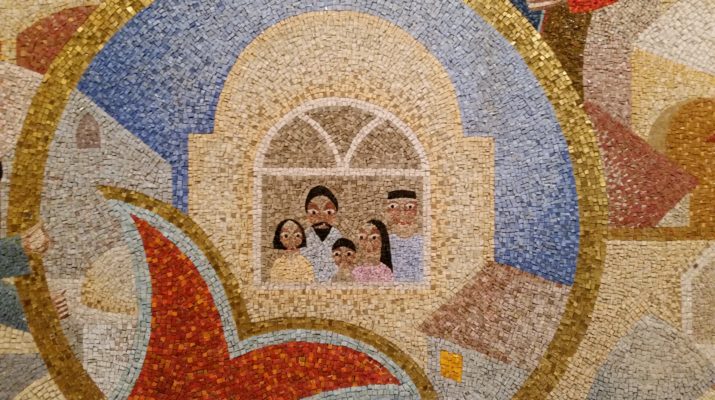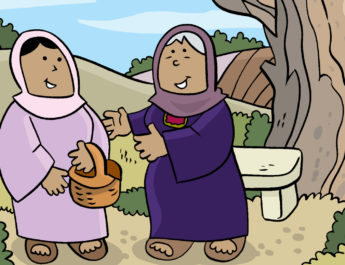Matthew 1:1-17
Narrative Lectionary 119
A Women’s Lectionary – First Sunday after Christmas Day A
1 An accountA of the genealogyB of JesusC the Messiah,D the son of David,E the son of Abraham.F
A “account” = biblos. 10x in NT– 5x in reference to books of the Bible, 3x of the book of life, 1x of genealogical account of Jesus, 1x of books of magic. Perhaps from bublos (papyrus); from Phoenician Byblos (a Phoenician city that exported papyrus for writing); {from gb (well, origin) + I (God)}; from Proto-Canaanite g-b-l (Gubla – maybe meaning to border). This is the inside bark of papyrus so it could refer to anything that was written on – a scroll, book, record, roll. It could also have an association with the sacred. See https://en.wiktionary.org/wiki/bible
B “genealogy” = genesis. 5x in NT. From ginomai (to come into being, to happen, become, be born; to emerge from one state or condition to another; this is coming into being with the sense of movement or growth). This is origin, lineage, birth, genealogy, or life. It can be figurative for nature. This is where the word “genesis” comes from.
C “Jesus” = Iesous. From Hebrew Yehoshua (Joshua, the Lord is salvation); {from YHVH (proper name of the God of Israel; the self-existent and eternal one); {from havah (to become) or from hayah (to come to pass, become, be)} + yasha (to deliver, defend, help, preserve, rescue; properly, to be open, wide or free, which implies being safe. So, in a causative sense, this is to free someone). This is Jesus or Joshua in Greek – the Lord saves or the Lord is salvation.
D “Messiah” = christos. From chrio (consecrate by anointing with oil; often done for prophets, priests, or kings). Literally, the anointed one, Christ. The Greek word for Messiah.
E “David” = dauid. From Hebrew David (David); from the same as dod (beloved, love, uncle); the root may mean to boil, which is used figuratively to describe love. So, this implies someone you love such as a friend, a lover, or a close family member like an uncle. David’s name likely means something like “beloved one.”
F “Abraham” = abraam. From Hebrew Abraham (exalted father); from the same as Abiram (exalted father, a high father – lofty) {from ab (father literal or figurative) + rum (rise, bring up, being high, extol, exalt, haughty; to raise in a literal or figurative sense)}. This is Abraham, father of many nations or father of a multitude.
2 Abraham was the father ofG Isaac,H and Isaac the father of Jacob,I and Jacob the father of JudahJ and his brothers,K
G “was the father of” = gennao. Related to “genealogy” in v1. From genna (descent, birth); from genos (family, offspring, kin – in a literal or figurative sense); from ginomai (see note B above). This is to beget, give birth to, or bring forth. Properly, it refers to procreation by the father, but was used of the mother by extension. Figuratively, this can mean to regenerate.
H “Isaac” = isaak. From Hebrew yitschaq (Isaac, “he laughs”); from tsachaq (to laugh, mock, play, make sport; this is laughing out loud whether in joy or in a scornful way). Isaac, meaning “he laughs.”
I “Jacob” = iakob. From Hebrew yaaqov (Jacob); from the same as aqeb (heel, hind part, hoof, rear guard of an army, one who lies in wait, usurper). This is James, meaning heel grabber or usurper.
J “Judah” = ioudas. From Hebrew Yehudah (Judah, son of Jacob, his tribal descendants, a name for the southern kingdom. Literally, it means praised); probably from yadah (to throw one’s hands into the air in a gesture of praise); from yad (hand). This is Judah or Judas, meaning praised.
K “brothers” = adelphos. From a (with, community, fellowship) + delphus (womb). This is a brother in a literal or figurative sense. It is also used of another member of the Church.
3 and Judah the father of PerezL and ZerahM by Tamar,N and Perez the father of Hezron,O and Hezron the father of Aram,P
L “Perez” = phares. 3x in NT. From Hebrew perets (a breach or a gap; a break, literal or figurative); from parats (to make a breach, burst out, compel, disperse; to break out literally or figuratively). This is Perez, meaning “breach.”
M “Zerah” = zara. 1x in NT. From Hebrew zerach (Zerah, Zerach); from the same as zerach (dawning, rising, shining); from zarach (to rise, shine, or dawn; can also describe symptoms of leprosy). This is Zerah or Zara, meaning “dawning.”
N “Tamar” = thamar. 1x in NT. From Hebrew tamar (Tamar; person and a place); from the same as tomer (palm tree, the trunk of that tree, a post); from tamar (root may mean being erect; a date palm or other palm tree). This is Tamar or Thamar, meaning “palm tree.”
O “Hezron” = hesrom. 3x in NT. From Hebrew chetsron (Hezron; person and a place); from the same as chatser (village, settlement).This is Hezron or Esrom, meaning “village.”
P “Aram” = aram. Related to “Abraham” in v1. 4x in NT. From Hebrew ram (Ram, meaning “high”); from rum (see note F above). Ram or Aram, a name meaning “high.”
4 and Aram the father of Aminadab,Q and Aminadab the father of Nahshon,R and Nahshon the father of Salmon,S
Q “Aminadab” = aminadab. 3x in NT. From Hebrew amminadab (Ammniadab, meaning “my kin is noble”); {from im (with, alike, near); {from amam (to darken, associate, hide)} + nadib (noble, generous, willing, voluntary); {from nadab (to offer willingly, volunteer)}}. This is Amminadab, meaning “my kin is noble.”
R “Nahshon” = naasson. 3x in NT. From Hebrew nachshon (Nachshon, meaning “enchanter”); from the same as nachash (to practice divination, learn by experience; to hiss as in whispering a spell). This is Nahshon or Naasson, meaning “enchanter.”
S “Salmon” = salmon. 2x in NT. From Hebrew salmon (Salmon, meaning “investiture”); from salmah (cloak, clothes, dress, wrapper); from simlah (mantle, clothes, wrapper); perhaps from semel (image, figure, likeness). This is Salmon, meaning “investiture.”
5 and Salmon the father of BoazT by Rahab,U and Boaz the father of ObedV by Ruth,W and Obed the father of Jesse,X
T “Boaz” = boos. 3x in NT. From Hebrew boaz (Boaz, meaning “quickness”). This is Boaz, meaning “quickness.”
U “Rahab” = rhachab. 1x in NT. From Hebrew rachab (Rahab); from rachab (wide, spacious, vast, proud, roomy); from rachab (to grow wide or enlarge in a literal or figurative sense; to extend, relieve, rejoice, or speak boldly). This is Rahab or Rachab, meaning “proud.”
V “Obed” = obed. 3x in NT. 3x in NT. From Hebrew obed (Obed, meaning “worshipper” or “serving”); from abad (to work, serve, or compel; any kind of work or service including religious devotion); to till or cultivate, enslave or keep in bondage). This is Obed, meaning “worshipper” or “serving.”
W “Ruth” = rhouth. 1x in NT. From Hebrew ruth (Ruth meaning “friendship” or “friend”); from reuth (neighbor, another, friend); from raah (to associate with, keep company, cultivate). This is Ruth, meaning “friendship” or “friend.”
X “Jesse” = iessai. 5x in NT. From Hebrew yishay (Jesse); perhaps from the same as yesh (being, existence, substance). This is Jesse, perhaps meaning “God exists.” See https://en.wiktionary.org/wiki/%D7%99%D7%A9%D7%99#Hebrew
6 and Jesse the father of KingY David. And David was the father of SolomonZ by the wife of Uriah,AA 7 and Solomon the father of Rehoboam,BB and Rehoboam the father of Abijah,CC and Abijah the father of Asaph,DD
Y “king” = basileus. Probably from basis (step, hence foot; a pace); from baino (to walk, to go). This is king, emperor, or sovereign.
Z “Solomon” = solomon.12x in NT. From Hebrew shelomoh (Solomon, meaning “peaceful”); from shalam (to be complete or sound; to have safety mentally, physically, or extending to one’s estate; so, if these things are safe and complete, the implication is that one would be friendly; and, if being friendly, one would make amends and that friendship would be reciprocated). This is Solomon, meaning “peaceful.”
AA “Uriah” = ourias. Related to “Jesus” in v1. 1x in NT. From Hebrew uriyah (Uriah meaning “flame of the Lord”); {from ur (flame, light, the east); {from or (to be light, shine literal or figurative)} + Yah (God, the Lord – shortened form of the holy name of God); {from YHVH (see note C above)}}. This is Uriah, meaning “flame of the Lord.”
BB “Rehoboam” = rhoboam. Related to “Rahab” in v5 & “Aminadab” in v4. 2x in NT. From Hebrew rechabam (Rechabam, meaning “a people are enlarged”); {from rachab (see note U above)} + am (people or nation; tribe, collectively of troops or armies, or figuratively a flock of animals.); {from amam (see note Q above)}.This is Rehoboam, meaning “a people are enlarged.”
CC “Abijah” = abia. Related to “Abraham” and “Jesus” in v1 & “Uriah” in v6. 3x in NT. From Hebrew abiyyah (Abiyyah, meaning “the Lord is my father” or “worshipper of the Lord”); {from ab (see note F above) + yah (see note AA above)}. This is Abijah or Abia, meaning “the Lord is my father” or “worshipper of the Lord”.
DD “Asaph” = asaph. 2x in NT. From Hebrew asaph (Asaph, meaning “gatherer” or “collector”); from asaph (to gather, assemble, or bring. It can also mean to take away, destroy, or remove). This is Asa or Asaph, meaning “gatherer” or “collector.”
8 and Asaph the father of Jehoshaphat,EE and Jehoshaphat the father of Joram,FF and Joram the father of Uzziah,GG 9 and Uzziah the father of Jotham,HH and Jotham the father of Ahaz,II and Ahaz the father of Hezekiah,JJ
EE “Jehoshaphat” = iosaphat. Related to “Abraham” and “Jesus” in v1 & “Uriah” in v6 & “Abijah” in v7. 2x in NT. From Hebrew yehoshaphat (Jehoshaphat, Yehoshaphat, meaning “the Lord has judged”); {from YHVH (see note C above) + shaphat (to judge, defend, pronounce judgment, condemn, govern)}. This is Jehoshaphat, meaning “the Lord has judged.”
FF “Joram” = ioram. Related to “Abraham” and “Jesus” in v1 & “Aram” in v3 & “Uriah” in v6 & “Abijah” and “Jehoshaphat” in v7. 2x in NT. From Hebrew Yoram (Joram or Jehoram, “the Lord is exalted”); {from YHVH (see note C above) + rum (see note F above)}. This is Joram or Jehoram, meaning “the Lord is exalted.”
GG “Uzziah” = ozias. Related to “Abraham” and “Jesus” in v1 & “Uriah” in v6 & “Abijah” and “Jehoshaphat” in v7 & “Joram” in v8. 2x in NT. From Hebrew uzziyyah (Uzziah, “my strength is the Lord”); {from oz (strength in the sense of force, majesty, praise, material and physical strength, the abstract notion of security; also social or political power) + Yah (see note AA above)}. This is Uzziah or Ozias, meaning “my strength is the Lord.”
HH “Jotham” = ioatham. Related to “Abraham” and “Jesus” in v1 & “Uriah” in v6 & “Abijah” and “Jehoshaphat” in v7 & “Joram” and “Uzziah” in v8. 2x in NT. From Hebrew yotham (Jotham, Yotham, “the Lord is perfect”); {from YHVH (see note C above) + tam (complete, integrity, peaceful, perfect, blameless person, undefiled, upright; complete, generally from a moral perspective; gentle or dear.); {from tamam (to finish or accomplish; to make perfect, demonstrate that you are upright; consume; to complete in a literal or figurative sense)}}. This is Jotham, meaning “the Lord is perfect.”
II “Ahaz” = achaz. 2x in NT. From Hebrew achaz (Ahaz, meaning “he has grasped” or “possessor”); from achaz (to grasp, catch, seize, take and hold in possession). This is Ahaz, meaning “he has grasped” or ”possessor.”
JJ “Hezekiah” = hezekias. Related to “Abraham” and “Jesus” in v1 & “Uriah” in v6 & “Abijah” and “Jehoshaphat” in v7 & “Joram” and “Uzziah” in v8 & “Jotham” in v9. 2x in NT. From Hebrew chizqiyyah (Hezekiah, “the Lord has strengthened”); {from chazaq (to strengthen, seize, be courageous, repair, bind, heal, conquer, harden) + Yah (see note AA above)}. This is Hezekiah or Ezekias, “the Lord has strengthened”
10 and Hezekiah the father of Manasseh,KK and Manasseh the father of Amos,LL and Amos the father of Josiah,MM 11 and Josiah the father of JechoniahNN and his brothers, at the time of the deportationOO to Babylon.PP
KK “Manasseh” = manasses. 3x in NT. From Hebrew menashsheh (Manasseh, “causing to forget”; Manasseh, his tribe, or the lands of the tribe.); from nashah (to forget, neglect, remove, deprive). This is Manasseh or Manasses, meaning “causing to forget.”
LL “Amos” = amos. 3x in NT. From Hebrew amots (Amos, meaning “strong”); from amets (to be strong, stout, alert, or bold; to harden, make firm, be courageous or mighty, fortify, or establish; physical alertness or mental courage or steadfastness). This is Amos, meaning “strong.”
MM “Josiah” = iosias. Related to “Abraham” and “Jesus” in v1 & “Uriah” in v6 & “Abijah” and “Jehoshaphat” in v7 & “Joram” and “Uzziah” in v8 & “Jotham” and “Hezekiah” in v9. 2x in NT. From Hebrew yoshiyyah (Josiah, “the Lord supports”); {from yah (see note AA above) + asheyah (buttress, pillar)}. This is Josiah, Josech, or Josias, meaning “the Lord supports.”
NN “Jechoniah” = iechonias. Related to “Abraham” and “Jesus” in v1 & “Uriah” in v6 & “Abijah” and “Jehoshaphat” in v7 & “Joram” and “Uzziah” in v8 & “Jotham” in v9 & “Josiah” in v10. 2x in NT. From Hebrew yekonyah (Jeconiah, meaning “the Lord will establish”); {from kun (properly, in a perpendicular position; literally, to establish, fix, fasten, prepare; figuratively, it is certainty, to be firm, faithfulness, render sure or prosperous) + yah (see note AA above) + asheyah (see note MM above)}. This is Jeoniah, Jechoniah, or Jechonias, meaning “the Lord will establish.”
OO “deportation” = metoikesia. 4x in NT. From metoikeo (to change one’s residence); {from meta (with, among, behind, beyond) + oikos (house – the building, the household, the family, descendants; the temple)}. This is literally a change of dwelling, but can also mean migration or deportation.
PP “Babylon” = babulon. 12x in NT. See Hebrew babel (Babylon or Babel); {perhaps from balal (to anoint, mix, overflow)} OR from Akkadian Bbilim; perhaps from earlier Sumerian name Ca-dimirra (gate of god). This is Babylon, meaning “gate of god” or “gate of gods.” See https://en.wikipedia.org/wiki/Babylon.
12 And after the deportation to Babylon: Jechoniah was the father of Salathiel,QQ and Salathiel the father of Zerubbabel,RR 13 and Zerubbabel the father of Abiud,SS and Abiud the father of Eliakim,TT and Eliakim the father of Azor,UU
QQ “Salathiel” = salathiel. 3x in NT. From Hebrew shealtiel (Shealtiel, meaning “I have asked of God); {from shaal (to ask, inquire, beg, borrow, desire, request; can also mean demand) + el (God, a god)}. This is Shealthiel or Salathiel, meaning “I have asked of God.”
RR Zerubbabel” = zorobabel. Related to “Babylon” in v11. 3x in NT. From Hebrew Zerubbabel (Zerubbabel, meaning “begotten in Babylon” or “descended of Babylon”); {perhaps from zarab (to burn, flow away) + babel (see note PP above)}. This is Zerubbabel, meaning “begotten in Babylon” or “descended of Babylon.”
SS “Abiud” = abioud. Related to “Abraham” in v1 & “Abijah” in v7. 2x in NT. From Hebrew abihud (Abihud, “my father is majesty” or “father of renown”); {from ab (see note above) + hod (splendor, majesty, glory, beauty, grandeur)}. This is Abiud or Abihud, meaning “my father is majesty” or “father of renown.”
TT “Eliakim” = eliakim. Related to “Salathiel” in v12. 3x in NT. From Hebrew elyaqim (Eliakim, “God sets up”); {from el (see note QQ above) + qum (to arise, stand, accomplish, establish, abide; rising against, getting up after being sick or asleep, arising from one state to another, becoming powerful, or rising for action; standing in a figurative sense)}. This is Eliakim, “God sets up.”
UU “Azor” = azor. 2x in NT. From Hebrew azzur (Azzur, meaning “helpful”); from azar (to help, protect, support, ally; properly, to surround so as to provide aid). This is Azzur, meaning “helpful.”
14 and Azor the father of Zadok,VV and Zadok the father of Achim,WW and Achim the father of Eliud,XX 15 and Eliud the father of Eleazar,YY and Eleazar the father of Matthan,ZZ and Matthan the father of Jacob,
VV Zadok” = sadok. 2x in NT. From Hebrew tsadoq (Zadok, a personal name); from tsadaq (to be just or righteous, do justice); from tsedeq (rightness, righteousness, just cause, vindication; that which is right in a natural, moral, or legal sense; abstractly equity; figuratively prosperity). This is Zadok or Sadoc, meaning “righteous.” It is where the Sadducees took their name from.
WW “Achim” = achim. Related to “Abraham” and “Jesus” in v1 & “Uriah” in v6 & “Abijah” and “Jehoshaphat” in v7 & “Joram” and “Uzziah” in v8 & “Jotham” and “Hezekiah” in v9 & “Josiah” in v10 & “Jechoniah” in v11 & Eliakim” in v13. 2x in NT. Probably from Hebrew similar to yoqim (Yoqim, Jokim, meaning “the Lord raises up”); {from YHVH (see note C above) + qum (see note TT above)}. This is Achim, meaning “the Lord raises up.”
XX “Eliud” = elioud. Related to “Salathiel” in v12 & “Eliakim” and “Abioud” in v13. 2x in NT. From el (see note QQ above) + hod (see note SS above). This is Eliud or Elioud, meaning “God of majesty.”
YY “Eleazar” = eleazar. Related to “Salathiel” in v12 & “Eliakim” in v13 & “Azor” in v13 & “Eliud” in v14. 2x in NT. From Hebrew elazar (Eleazar, “God has helped” or “God is helper”); {from el (see note QQ above) + azar (see note UU above)}. This is Eleazar, meaning “God has helped” or “God is helper.”
ZZ “Matthan” = matthan. 2x in NT. From Hebrew mattan (Mattan); from the same as mattan (gift, reward, to give); from natan (to give, put, set, offer; to give literally or figuratively). This is Matthan, meaning “giving” or “gift.”
16 and Jacob the father of JosephAAA the husbandBBB of Mary,CCC of whom Jesus was born, who is called the Messiah.
17 So all the generationsDDD from Abraham to David are fourteen generations; and from David to the deportation to Babylon, fourteen generations; and from the deportation to Babylon to the Messiah, fourteen generations.
AAA “Joseph” = ioseph. From Hebrew Yoseph (he increases; Joseph); from yasaph (to add, increase, continue, exceed). This is Joseph, meaning “he increases.”
BBB “husband” = aner. This is man, male, husband, or fellow. It can also refer to an individual.
CCC “Mary” = maria. From Hebrew Miryam (Aaron and Moses’s sister); from marah (to be contentious, rebellious, bitter, provoking, disobedient; to be or make bitter or unpleasant; figuratively, to rebel or resist; causatively to provoke). This is Miriam or Mary.
DDD “generations” = genea. Related to “genealogy” in v1 & “was the father of” in v2. From genos (family, offspring, kin – in a literal or figurative sense); from ginomai (see note B above). This is family, generation, kind, or nation. As generation, it implies an age as a period of time. It can also mean infinity. This is the root of the word “generation.
Image credit: “Yaffo – Tel Aviv: Second Generation.” Photo by JHistory, 2014.




